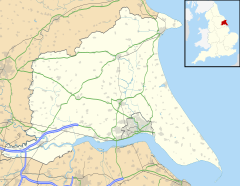Bubwith
| Bubwith | |
|---|---|
 Church Street, Bubwith |
|
| Bubwith shown within the East Riding of Yorkshire | |
| Population | 1,225 (2011 census) |
| OS grid reference | SE711363 |
| • London | 165 mi (266 km) S |
| Civil parish |
|
| Unitary authority | |
| Ceremonial county | |
| Region | |
| Country | England |
| Sovereign state | United Kingdom |
| Post town | SELBY |
| Postcode district | YO8 |
| Dialling code | 01757 |
| Police | Humberside |
| Fire | Humberside |
| Ambulance | Yorkshire |
| EU Parliament | Yorkshire and the Humber |
| UK Parliament | |
Bubwith is a village and civil parish in the East Riding of Yorkshire, England. The village is situated about 6 miles (10 km) north-east of Selby, and 7 miles (11 km) north of Goole. It is situated on the east bank of the River Derwent, west of which is the Selby district of North Yorkshire. It lies on the A163 road.
The civil parish is formed by the villages of Bubwith and Breighton and the hamlets of Gunby and Willitoft. According to the 2011 UK census, Bubwith parish had a population of 1,225, an increase on the 2001 UK census figure of 1,104.
The ancient parish of Bubwith also covers the village of Breighton and the hamlets of Gunby and Willitoft, but its location on and crossing over the River Derwent led to its becoming the largest settlement in the area.
The village's name means Bubba's wood, Bubba being a Scandinavian male name. It is listed as "Bobewyth" in the 11th-century accounts of Selby Abbey.
In the Domesday account Bubwith is written as "Bubuid". Before the Conquest, lordship was held by Alwin and Ketil; after, Gilbert Tison became Tenant-in-chief.
Though there has been a recorded river crossing since at least the year 1200, the present bridge over the Derwent, consisting of three limestone arches and several flood arches, replaced a "dangerous and inconvenient" ferry service when it was built in 1798. Crossing the bridge required a toll until 1936, with the original costs amounting to three shilling for six horses, and 10 pence for twenty head of oxen. Certain vehicles, such as funeral processions, were exempt from the toll.
...
Wikipedia

